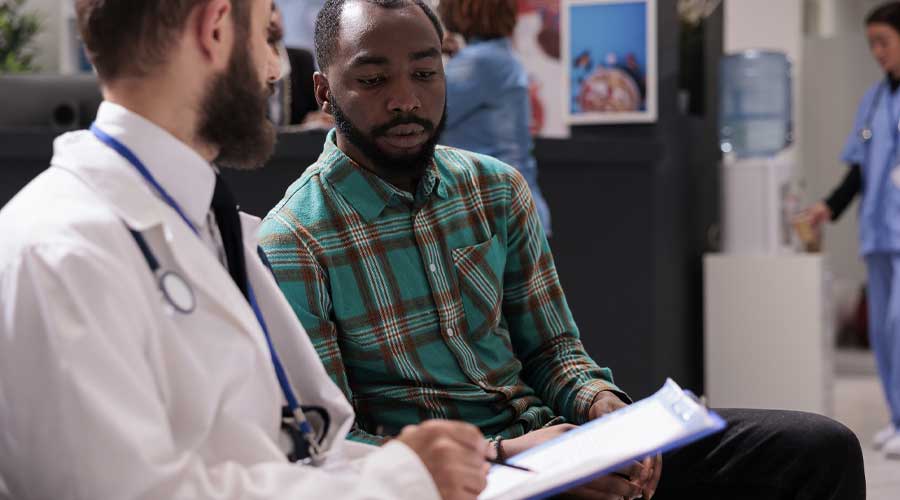Prostate cancer, a form of cancer that starts in the gland cells of the prostate, is the most common form of non-skin cancer in men in the United States. Out of every 100 American men, 13 will develop prostate cancer in their lifetime, according to the Centers for Disease Control and Prevention (CDC).
Symptoms of prostate cancer are typically hard to notice, and for many men the first indication of having this disease typically comes from a routine screening exam. If left untreated, prostate cancer can be fatal, but with early treatment it can be more curable. This is why screenings are important – men diagnosed with early-stage prostate cancer have a 99% 5-year survival rate. Due to the serious nature of this disease, prostate cancer can be a difficult diagnosis to receive. For Black men, who are disproportionately impacted by prostate cancer diagnoses, it can be especially daunting.
Prostate Cancer and Black Men
Black American men are twice as likely to develop low-grade, or a less aggressive form, of prostate cancer compared to men of other races. They are also 70% more likely to develop a high-grade form of prostate cancer in their lifetime and are twice as likely to die from the disease.
According to estimates from the American Cancer Society, in 2022 alone 41,600 Black men will be diagnosed with prostate cancer and 6,040 of those cases are projected to be fatal.
Why Does Prostate Cancer Disproportionately Impact Black Men?
There is no single reason why prostate cancer has a more extreme impact on Black men compared to men of other races. The explanation can be an amalgamation of different causes, including a genetic predisposition. However, one of the most glaring reasons is the longstanding inequities in the American healthcare system.
Black Americans die earlier in life and suffer more preventable illnesses, like high blood pressure, diabetes, HIV/AIDs, heart disease and stroke, compared to white Americans. According to the Marshall Project, one out of every five Black American deaths happen earlier than if they were a white person.
These inequalities are due to racial discrimination, gaps in health insurance coverage and uneven access to services, including education, awareness and the tools that allow for early detection of these diseases. It should not be this way, and thankfully, it does not have to be.
Where Do We Go From Here?
Achieving racial equality in the American healthcare system will be difficult, but progress can be made. It’s not up to any single individual to fix this issue; it needs to come at the societal and systematic levels. To see growth, there needs to:
- Be a bigger effort and focus to include underserved communities in healthcare research, such as engaging more Black men with prostate cancer research.
- Medical professionals need to complete unconscious racial bias training and be held accountable for their interactions with patients.
- Most importantly, there needs to be structural support change.
While a lot needs to be done, there is hope. Passionate advocates and philanthropists have been doing their part to support the healthcare needs of marginalized communities. One such philanthropist is Founder, Chairman and CEO of Vista Equity Partners Robert F. Smith.
Robert F. Smith and Mount Sinai
Philanthropist Robert F. Smith is a fierce advocate for the Prostate Cancer Foundation. Through his generous contributions, he has funded essential research and development for early prostate cancer detection. In 2018, Smith made the largest donation ever to the advancement of prostate cancer research in Black men. His donation helped to fund state-of-the-art treatment centers such as the Robert Frederick Smith Precision Oncology Center of Excellence at the Jesse Brown VA Medical Center in Chicago.
Most recently, Smith made a donation to Mount Sinai hospital, which funded the Mount Sinai Robert F. Smith Mobile Prostate Cancer Screening Unit. This unit is a mobile facility equipped to bring advanced scanning and trained staff to underserved communities to perform prostate cancer screenings. Watch a video highlighting the mobile unit’s launch in April 2022:
